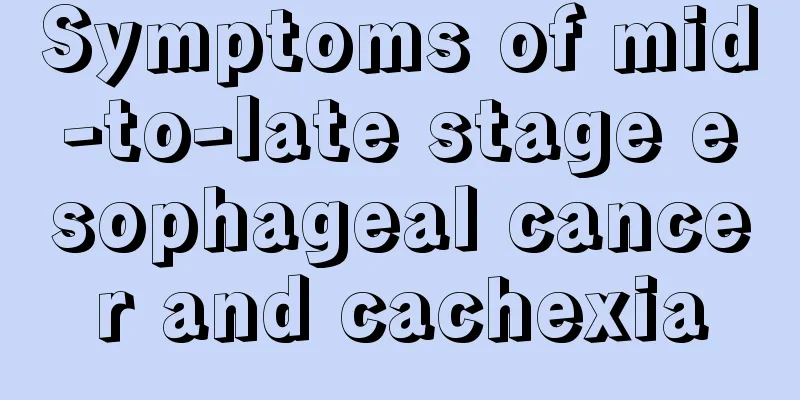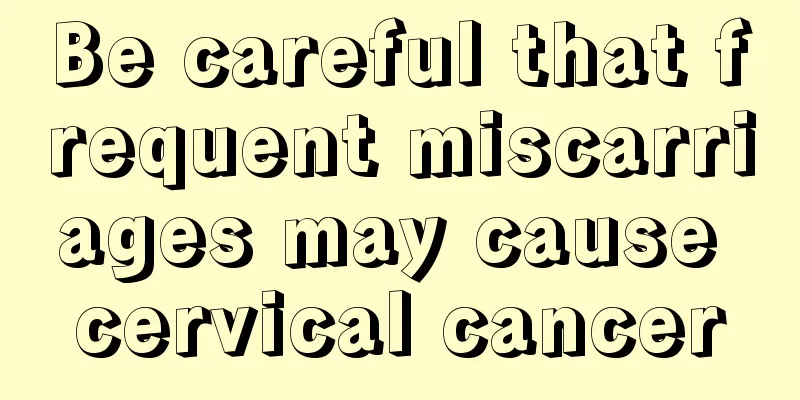Symptoms of mid-to-late stage esophageal cancer and cachexia

|
Research has found that patients in the middle and late stages of esophageal cancer experience difficulty swallowing, cannot swallow solid food smoothly, or swallow it after washing it with soup, and then have difficulty swallowing semi-liquid food. Finally, they also have difficulty swallowing liquid food, followed by chest pain or back pain, esophageal cancer, late stage esophageal cancer, esophageal cancer symptoms... Symptoms of advanced esophageal cancer and cachexia: Studies have found that patients in the middle and late stages of esophageal cancer experience difficulty swallowing, cannot swallow solid food smoothly, or swallow it after washing it with soup, and then have difficulty swallowing semi-liquid food. Finally, they have difficulty swallowing liquid food, followed by chest pain or back pain, vomiting mucus, and lumps in the neck and clavicle. When the tumor directly invades or metastases compress the recurrent laryngeal nerve, vocal cord paralysis occurs, leading to hoarseness, bleeding, shortness of breath, and dry cough. In addition, when widespread cancer cell metastasis occurs throughout the body, it can induce symptoms such as jaundice, ascites, abnormal liver function, dyspnea, cough, headache, coma, etc. In severe cases, esophageal obstruction or complete obstruction may occur, leading to systemic failure. Therefore, early detection, early diagnosis, and early treatment are the key to treating esophageal cancer. To improve the early detection and diagnosis of esophageal cancer, it is necessary to popularize the knowledge of esophageal cancer among the general population, and to conduct examinations at least once a year for high-risk groups, and once every three months for those with high-risk symptoms. Examination methods include esophageal cytology, esophageal X-ray examination, esophagoscopy, serological examination including carcinoembryonic antigen and squamous cell carcinoma antigen, etc., among which esophagoscopy is particularly important. Esophageal cancer is a malignant tumor that occurs in the esophageal epithelial tissue, accounting for 2% of all malignant tumors. About 200,000 people die of esophageal cancer every year worldwide. my country is a high-incidence area for esophageal cancer, and the number of deaths due to esophageal cancer ranks second only to gastric cancer. Most people are over 40 years old, and there are more males than females. However, in recent years, there has been an increasing trend in the number of people under 40 years old. The occurrence of esophageal cancer is related to chronic stimulation by nitrosamines, inflammation and trauma, genetic factors, and the content of trace elements in drinking water, food and vegetables. The Hospital's Traditional Chinese Medicine Tumor Research and Treatment Center specializes in the treatment of esophageal cancer, gastric cancer, liver cancer, and lung cancer. Related information on the treatment of esophageal cancer with traditional Chinese medicine: The Esophageal Cancer Research Institute, the Traditional Chinese Medicine Tumor Research and Treatment Center of Henan Modern Medical Research Institute Hospital, and the Traditional Chinese Medicine Esophageal Cancer Treatment Center are scientific research and clinical institutions that specialize in the research and treatment of esophageal cancer, cardia cancer, and gastric cancer. It is composed of more than 30 well-known tumor experts. After years of dedicated research and clinical trials, they have jointly developed a series of special anti-cancer pure Chinese medicines. The "three-in-one therapy" is mainly used to treat different symptoms caused by esophageal cancer, cardia cancer, and gastric cancer, such as choking and regurgitation of food, continuous sticky phlegm, vomiting after eating, regurgitation of food, difficulty in swallowing, weight loss, hoarseness, chest tightness, fatigue, and reflex pain of lesions. It has good results. The above is all we have to say about the manifestations of esophageal cancer in the middle and late stages and cachexia. If you need to know more, please call our expert consultation hotline or consult our online experts. Esophageal cancer http://www..com.cn/zhongliu/sda/ |
<<: Early clinical manifestations of esophageal cancer
>>: What are the early symptoms of esophageal cancer?
Recommend
Elderly bladder cancer treatment and examination items
Bladder cancer is a common malignant tumor of the...
Does colonoscopy hurt?
After all, this is a hard object. Although it can...
How to store grapes for a long time
Grapes are a fruit that is loved by both adults a...
How to cure hoarseness of throat?
In daily life, hoarseness is a common condition. ...
How to remove the blackening of the toilet edge
With the development of our social economy and ev...
People need to pay attention to the common causes of lung cancer
Lung cancer is now a common tumor disease that ha...
What are the symptoms of anemia headache
Incomplete nutrition absorption or irregular diet...
What are the five items in a routine blood test?
When you go to the hospital for a physical examin...
Popular science related to prostate cancer 1: Introduction to the diagnosis and treatment of prostate cancer
Why does prostate cancer occur? The prostate is a...
How to reduce neck wrinkles
Love of beauty is everyone's nature, especial...
Pancreatitis recipes
Pancreatitis is a common clinical disease, and th...
The efficacy and function of sandalwood bracelets
Sandalwood bracelets have been very popular in re...
How much do you know about the causes of cervical tumors?
What is the cause of cervical cancer? I think thi...
What are the typical symptoms of lung cancer in the early stage? Several typical symptoms of lung cancer in the early stage
When lung cancer patients cough, they find phlegm...
How to heat up leftovers
Whether dining out or at home, we usually encount...









